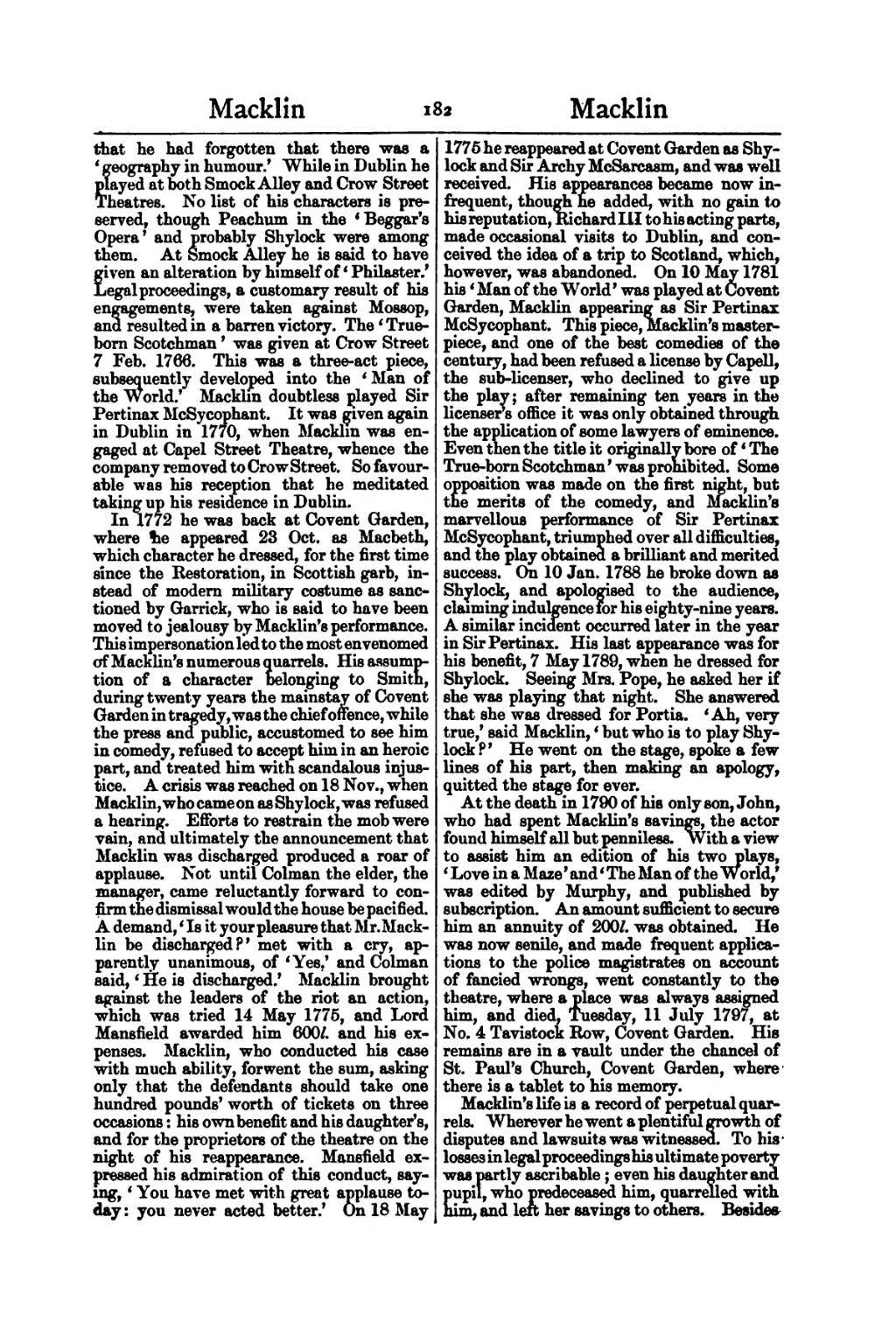that he had forgotten that there was a
'geography in humour.' While in Dublin he
played at both Smock Alley and Crow Street
Theatres. No list of his characters is preserved, though Peachum in the 'Beggar's Opera ' and probably Shylock were among them. At Smock Alley he is said to have given an alteration by himself of ' Philaster.' Legal proceedings, a customary result of his engagements, were taken against Mossop, and resulted in a barren victory. The ' True-born Scotchman ' was given at Crow Street 7 Feb. 1766. This was a three-act piece, subsequently developed into the 'Man of the World.' Macklin doubtless played Sir Pertinax McSycophant. It was given again in Dublin in 1770, when Macklin was engaged at Capel Street Theatre, whence the company removed to Crow Street. So favourable was his reception that he meditated taking up his residence in Dublin. In 1772 he was back at Covent Garden, where he appeared 23 Oct. as Macbeth, which character he dressed, for the first time since the Restoration, in Scottish garb, instead of modern military costume as sanctioned by Garrick, who is said to have been moved to jealousy by Macklin's performance. This impersonation led to the most envenomed of Macklin's numerous quarrels. His assumption of a character belonging to Smith, during twenty years the mainstay of Covent Garden in tragedy, was the chief offence, while
the press and public, accustomed to see him
in comedy, refused to accept him in an heroic part, and treated him with scandalous injustice. A crisis was reached on 18 Nov., when Macklin, who came on as Shylock, was refused a hearing. Efforts to restrain the mob were vain, and ultimately the announcement that Macklin was discharged produced a roar of applause. Not until Colman the elder, the manager, came reluctantly forward to confirm the dismissal would the house be pacified. A demand, 'Is it your pleasure that Mr. Macklin be discharged?' met with a cry, apparently unanimous, of 'Yes,' and Colman said, 'He is discharged.' Macklin brought against the leaders of the riot an action,
which was tried 14 May 1775, and Lord Mansfield awarded him 600l. and his expenses. Macklin, who conducted his case with much ability, forwent the sum, asking only that the defendants should take one hundred pounds' worth of tickets on three occasions: his own benefit and his daughter's, and for the proprietors of the theatre on the night of his reappearance. Mansfield expressed his admiration of this conduct, saying, 'You have met with great applause today: you never acted better.' On 18 May he reappeared at Covent Garden as Shylock and Sir Archy McSarcaam, and was well received. His appearances became now infrequent, though he added, with no gain to his reputation, Richard III to his acting parts, made occasional visits to Dublin, and conceived the idea of a trip to Scotland, which, however, was abandoned. On 10 May 1781 his ' Man of the World ' was played at Covent Garden, Macklin appearing as Sir Pertinax McSycophant. This piece, Macklin's masterpiece, and one of the best comedies of the century, had been refused a license by Capell, the sub-licenser, who declined to give up the play ; after remaining ten years in the licensers office it was only obtained through the application of some lawyers of eminence.
Even then the title it originally bore of 'The True-born Scotchman' was prohibited. Some opposition was made on the first night, but the merits of the comedy, and Macklin's marvellous performance of Sir Pertinax McSycophant, triumphed over all difficulties, and the play obtained a brilliant and merited success. On 10 Jan. 1788 he broke down as Shylock, and apologised to the audience, claiming indulgence for his eighty-nine years. A similar incident occurred later in the year
in Sir Pertinax. His last appearance was for his benefit, 7 May 1789, when he dressed for Shylock. Seeing Mrs. Pope, he asked her if she was playing that night. She answered that she was dressed for Portia. 'Ah, very
true,' said Macklin, 'but who is to play Shylock?' He went on the stage, spoke a few lines of his part, then making an apology, quitted the stage for ever.
At the death in 1790 of his only son, John, who had spent Macklin's savings, the actor found himself all but penniless. With a view to assist him an edition of his two plays, 'Love in a Maze' and 'The Man of the World,' was edited by Murphy, and published by subscription. An amount sufficient to secure him an annuity of 200l. was obtained. He was now senile, and made frequent applications to the police magistrates on account of fancied wrongs, went constantly to the theatre, where a place was always assigned him, and died, Tuesday, 11 July 1797, at No. 4 Tavistock Row, Covent Garden. His remains are in a vault under the chancel of St. Paul's Church, Covent Garden, where there is a tablet to his memory.
Macklin's life is a record of perpetual quarrels. Wherever he went a plentiful growth of disputes and lawsuits was witnessed. To his was partly ascribable ; even his daughter and pupil, who predeceased him, quarrelled with him, and left her savings to others. Besides
